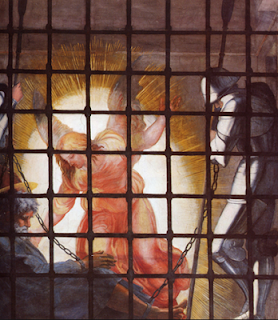TO CHEW ON: "And Jesus...said to them, 'Whoever receives this little child in My name receives Me; and whoever receives Me receives Him who sent Me. For he who is least among you'll be great.'" Luke 9:48
In our passage today Jesus again confronts His disciples (and us) with the upside-downness of the kingdom of heaven. The disciples are arguing about who will be the greatest. Jesus answers by putting a child before them and making the startling statement, "Whoever receives this little child in My name receives Me."
In a passage that speaks of the same event, Matthew reports Jesus saying, "Unless you are converted and become as little children, you will by no means enter the kingdom of heaven" Matthew 18:3.
What qualities of children make them good kingdom citizens? I can think of at least five (and [Ha!] they all start with 't' just like a sermon).
Children are trusting. Look at how a child lays its head on the shoulder of a parent and falls asleep. That's how we are to trust God .
Children are transparent. They easily show their feelings and live without trying to be someone they are not. Jesus told His disciples to live with such lack of guile: "Let your yes be yes, your no, no."
Children are teachable. Think of the ways a child develops physical skills, picks up language and attitudes. Such a teachableness is the key to entering the kingdom and continuing in it.
Children are tolerant. They don't discriminate against people because of shabby clothes or poor social standing. We should be just as accepting.
Children are telling. A little child full of good news finds it impossible to keep that news inside. We are to be just as overflowing with the good news that our sins are forgiven, our friendship with God is restored and that we have eternal life.
I ask myself, am I nurturing within me these childlike qualities? Are you?
Jesus: “... unless you are converted and become as little children
you will by no means enter the Kingdom of Heaven.” Matthew 18:3
You lose sophistication and veneer
and become clear
sing, skip and play
easily laugh and cry
then fall asleep without a care
for Daddy is nearby.
No longer do you worry
about whether there will be
food to eat, clothes to wear
how to get from here to there.
You’re malleable clay again
learning your family’s ways and graces.
And once again you fit
into small places.
© 2007 by Violet Nesdoly — all rights reserved.
The Holy Bible, New King James Version Copyright © 1982 by Thomas Nelson, Inc. - Used with permission.














